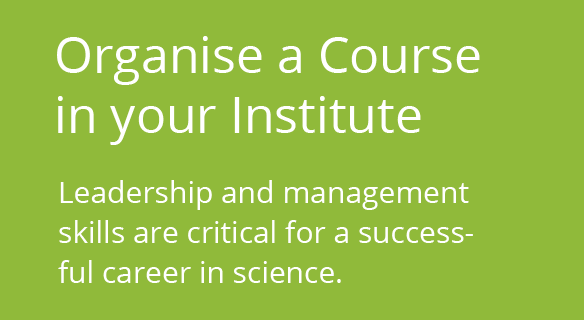< Back to Overview of Course Dates
EMBO Laboratory Leadership - Online Course
PLEASE NOTE THAT THIS IS AN ONLINE COURSE TAKING PLACE OVER 3 DAYS. THE COURSE TIMES EXPRESSED BELOW ARE IN THE CURRENT TIME ZONE IN BERLIN, GERMANY (adjusted for 'daylight saving' when appropriate).
You must provide an institutional VAT ID so that the VAT can be applied in your own country.
PURPOSE
The aim is to explore with attendees their own approach to leadership – and the approaches of the other participants - and use this insight to define for each individual how they want to lead and manage their research groups or other teams. The course also provides insight into how teams work best together and how to identify and resolve barriers to the efficient operation of teams. Throughout the course, the trainers provide tools, techniques and insight tailored specifically to the laboratory/research setting for the management of teams, good communication, healthy resolution of conflict and the management of workloads and responsibilities.
STYLE
The course is adapted from our in-person courses and enhanced for online. Each module begins with an introduction from our trainers followed by the use of a range of interactive tools – both in self-reflection and in small group breakout activities – to integrate examples, experiences, and ideas from participants into the learning environment. Because much of the course content is derived from the experience of the participants, and because it was developed by EMBO with professional leadership consultants, the course is tailored directly to the experience and professional needs of scientific researchers. The examples used are familiar and apt to the audience and of direct relevance to their leadership roles.
The course is delivered virtually via Zoom. Participants will need a web camera, microphone, preferably headphones, and a quiet place with reliable internet from which to attend the course. If participants are uncomfortable using Zoom or being on camera, or their internet is unreliable, then unfortunately they will be unable to attend the course.
The course is conducted in an interactive seminar style and we expect participants to attend the course in full. Their absence from any session will be detrimental not only to them, but also to their partners in the breakout sessions. If participants anticipate any unavoidable issues with the course schedule, we ask you to let us know so that we can make appropriate allowances.
You will need to be able to attend from a quiet place where you can work undisturbed. You will need a good internet connection, a webcam and a microphone for video calling. The course uses Zoom.
TRAINERS
Our trainers come from many different backgrounds, and all have been working directly and extensively with leaders in the life sciences for many years. Our training team includes scientists, organisational development experts, human resources professionals, MBA graduates, mathematicians, professional coaches, scientists from industry, and others with significant and relevant experience to supporting leaders in the life sciences to improve their leadership and develop their teams and strategies.
For each course, we provide two trainers to deliver the workshop and work to balance their expertise and diversity to ensure that you receive the widest range of expertise, experience and insight possible from your training team.
PROGRAMME
Schedule:
- All timings are approximate, as we will be working in a process-oriented manner. The time spent on a topic will expand or shrink to meet the needs of the course participants.
- We will work from 09.00 to 17.30 on all days (CET/Berlin, always adjusted for 'daylight saving' time in Europe).
- We will be taking regular 5 and 10 minutes breaks throughout the day (approx every hour), with a 1 hour break for lunch.
DAY I 
|
60 mins |
Welcome, Introduction, Warming up Activity: Giving you time "to arrive" at the workshop and for our trainers to introduce the topics for the course. We open the "Parking Lot" for your questions and challenges. |
|
60 mins |
What is leadership? Activity: You are invited to reflect on good leaders that you have known and to co-develop a definition of good leadership. You then reflect on your own day-to-day activities to determine for yourself how much of your work is about managing and how much is about leading, and what steps you can take to achieve the appropriate mix. |
|
120 mins |
The leadership role Activity: You are introduced to J.L. Moreno’s ‘Role Theory’ and ‘Role Atom’ tool. You then use the Role Atom to analyse the different roles you play on a daily basis, identify which are important for your success and which are comfortable and uncomfortable for you and why. You then work on a plan to develop yourself in those roles that are important but uncomfortable. |
|
90 mins |
The impact of working environment Activity: You are invited to take on the perspectives of the different groups in your working environment: lab members, PIs, leadership team (e.g. director of institute). The trainers then facilitate a discussion between these three groups. After the discussion, you and your group capture the expectations you heard articulated by the other groups and discuss when and how to raise these expectations. |
|
45 mins |
Emotional Intelligence Activity: You are introduced to the concept of Emotional Intelligence and given an opportunity to reflect on your own emotions and behaviour in the context of the model. |
|
45 mins |
The impact of personality on leadership - Part 1 Activity: You are introduced to a particular personality model, the Instinctual Bias, to help you develop your own Emotional Intelligence and increase your awareness and understanding of your colleagues. You reflect on how aware you are of your different responsibilities and areas of work, and how you take care of them (or struggle to), using this tool as the analytical and creative lens. |
DAY II
|
15 mins |
Welcome, Warming up Activity: The group reflects on the previous day, the trainers answer any burning questions, and orient to group toward the new day's work |
|
100 mins |
The impact of personality on leadership - Part 2 Activity: You continue your exploration of personality models as tools to support you in developing your awareness and strategies for improving well-bring, relationships and work. You are introduced to the Enneagram of Personality and given an opportunity to work in small groups to share your awareness and understanding. You develop strategies to solve challenges you are facing using the Enneagram as the analytical and creative lens to do so. |
|
60 mins |
Working with values Activity: You are encouraged to reflect on the values present in your work environment, and then to select and discuss 4 or 5 values that you would like to cultivate in your laboratories (or among the people you are leading) to ensure productive, fulfilling work. You are introduced to a strategy for implementing these values in you group or small team. |
|
45 mins |
Motivation Activity: You are introduced to F. Herzberg’s 2-factor motivation model and are encouraged to reflect on the barriers to your own motivation. You are shown how to use the model to help yourself and your people achieve higher levels of self-motivation. |
|
60 mins |
Giving feedback and criticism Activity: You are introduced to a tool for giving feedback on positive and negative behaviour. You are encouraged to help develop a culture of giving and receiving feedback within your group. Your are given an opportunity to practise using this tool by preparing and giving feedback that is meaningful to you. |
|
120 mins |
Communication Activity: You are introduced to E. Bern’s Transactional Analysis model of communication. You are encouraged to consider emotion a normal part of communicating and working with others, and to understand that the emotional content of a conversation needs to be handled with awareness, empathy and skill (for yourself and the other). You then work in small groups to practice challenging conversations using the model with the support of the trainers. |
DAY III
|
30 mins |
Welcome, Warming up Activity: The group reflects on the previous day, the trainers answer any burning questions, and orient to group toward the new day's work |
|
120 mins |
Conflict in the lab Activity: You are introduced to F. Glasl’s model of conflict, as well as other aspects of conflict theory and resolution. You will then work through a conflict case (provided by yourself or another member of the group), applying the theory to a real situation in support of someone in the group. |
|
80 mins |
Team dynamics Activity: You are introduced to B. Tuckman’s model of team development. You are then invited to consider the practical steps you could take at each stage of your group’s development. |
|
45 mins |
Delegation Activity: You learn about situational leadership and how to use it to adapt the way you delegate specific tasks to different people. You are also given an opportunity to reflect on how you prioritise your own work and the work you are given by others. |
|
45 mins |
Who's got the monkey? (developing problem-solving skills and independence in your people) Activity: You learn a method related to coaching that helps you to help your people solve their own simple problems. You are given an opportunity to play with this tool. |
|
30 mins |
Wrap-up and Next Steps Activity: You reflect on the course and what you have learned. Your are given an opportunity to begin to develop an action plan to implement some of your new knowledge. |
|
30 mins |
Course Close We say goodbye and close the course. |



